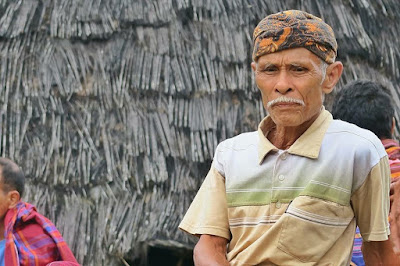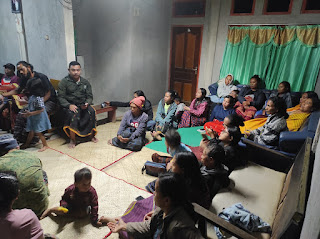Get Lost in a City
A ceremony is a time when all relatives get together again. For
married women, the ceremony is a very appropriate time to see families who have
been left behind since marriage and mainly because of the Manggaraian culture
which requires women to follow their husbands after marriage.
Just 3 years ago in September, all my
relatives from the village came to Ruteng to get involved in the a ceremony to prepare for the wedding. It was the first time my family held a “Kumpul Kope” ceremony or a ceremony that aims to collect dowry.
In this ceremony, relatives brought some money and animals such as chickens and pigs. These main items are collected as the dowry which will be brought to the bride's family on the day of the wedding or known as "Belis".
Relatives who had known previously that the
ceremony would be held in Ruteng felt it was right to see how the city looked like.
Some relatives came with their children only because the children screamed for
their mothers to go together to experience the rare city atmosphere for the
first time.
 |
| Ruteng, Flores, Indonesia (source). |
My aunt Ester has never thought of Ruteng
as a big city. She spends most of her time in Nangis, a village located in the
Mandosawu Mountains in the northern part of the capital city of Borong in East
Manggarai, Flores. It took several hours on foot to reach the main road from
the village to get on the public transportation.
When she found out that the ceremony was
going to take place in Ruteng, she felt very enthusiastic and at the same time it was her biggest fear. She was really afraid of car sick because she had never
been in a car before.
Her husband and friends in the village advised her some tricky things to string a
banana around her belt or hold a small piece of rock to avoid vomiting in the
car. Aunt Ester chose to do both things because she thought it was easy enough
to practice.
She asked her son to do the same. Aunt Ester
took her son while her husband went on the motorbike with his friend.
At 4 am, they started leaving the village.
She carried one big rooster and a bag containing not only their clothes but also
food for breakfast while her sleepy son moved his legs to catch public
transport to get to Borong where they could catch a travel car to reach Ruteng.
"Oto
colt" or known as a wooden truck is a type of transportation that
carries passengers and commodities from the village to the main city. The truck
left early in the morning to pick up passengers and returned from the city for
the day. Because there is only one "Oto
colt", passengers must be better prepared on the road so they don't
miss out.
 |
| "Oto Colt" |
It took about 2 hours to arrive in Borong.
The road from the village is narrow and very bumpy which caused them to get off
several times so that the trucks can pass through the road with lighter loads.
 |
| "oto colt" or a wooden truck to take passengers and commodity from countryside. |
After a very challenging journey, they arrived in Borong safely and Aunt Ester and her son passed the challenge without vomit. They smiled and felt very happy.
Since the driver had known that they wanted to go to Ruteng, he helped them to show the travel car and informed where to get off in Ruteng. Everything was so well organized until they enjoyed their home-brought breakfast. Aunt Ester reminded her son to check if the banana belt and rocks were still there as they would face another new challenge.
The road from Borong to Ruteng was
completely different from what they had experienced in the village, a very
large and well-constructed road.
Highway conditions affected the speed of
the car. Mum and son looked very nervous. This time
the banana rope and rock seemed not working. After half an hour drive, Efrem,
aunt Ester’s son could easily fall to sleep but his mum tried hard to sleep so
that she did not feel the pain. She managed to stop the car so that she could
go out to refresh herself, and it worked well. She kept doing it till they
finally arrived in Ruteng safely.
They dropped off onto the road 100 meters
from my house but Aunt Ester thought they had arrived at the correct location.
By the time aunt Ester got out of the car, she finally vomited, she couldn't hold
it anymore. However, vomiting made her feel not so bad.
She was very surprised to find that the bag
and rooster were left in the car. She forgot to take it out because she was
sick. She immediately stopped an “ojek”
or motorbike taxi to catch the car, while Efrem was left alone.
Aunt Ester was in a hurry, she was very
afraid of losing the bag and the rooster, she never thought of Efrem, she
thought if it was in the right place where they wanted to go.
 |
| Efrem, Aunt Ester's son. |
They managed to ride back up to get home just 10 minutes from town. My family and I had been waiting for her arrival in the front yard of the house.
When she saw us, Aunt Ester thought it was the end of challenging day. She looked very happy and a big smile was shown on her face. She thanked and paid the rider and the rider left immediately. However, that happiness did not last longer.
The first question was, "where is
Efrem?". "Efrem?", Who is Efrem? My brother and I asked. She
replied, “My son, he came with me. I left him here while I was chasing car ”.
We answered; "No, we didn’t see him here.
It wasn't a warm welcome at all, because we were all so panic. On the other hand, aunt Ester sat by the side of the road with her right hand on her forehead and started to cry.
We decided to ask her where she left him but she didn't know at all, all she understood was that they got off the car in the right place.
Dion, my brother got on a motorbike with aunt Ester and started searching for Efrem and I looked for him myself. I failed because of having less information about Efrem. No picture and no idea how his physical appearance, all I knew was just her age which was still 10 years.
After 3 hours of searching, Dion returned
with two more people on her motorbike, Aunt Ester and Efrem. My family and
relatives who arrived earlier celebrated their arrival very warmly. It was a
very dramatic moment that could disrupt the marriage experience.
 |
| Uncle Stanis, Aunt Ester's husband. |
That vomit stuffs helped
her to spot the area where she began to ask people around about her missing
child. It did not take time because she asked to the guy who had let Efrem to
stay in his house till his mum came to pick.
The message from this story is clear we can always learn fascinating lessons behind the disgusting thing we do.


Komentar